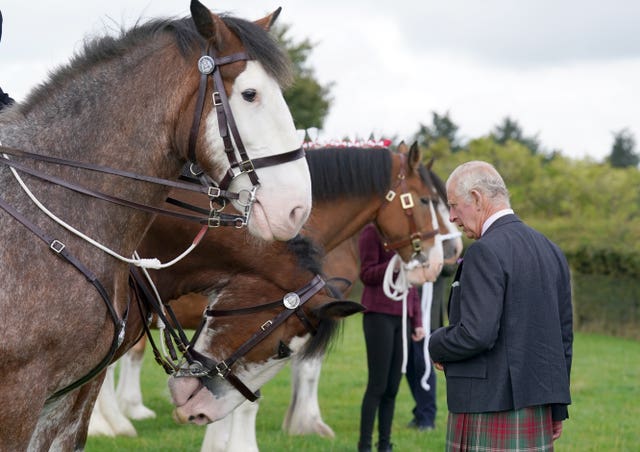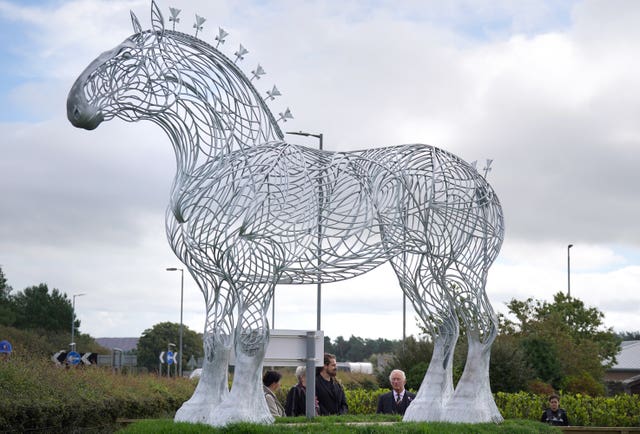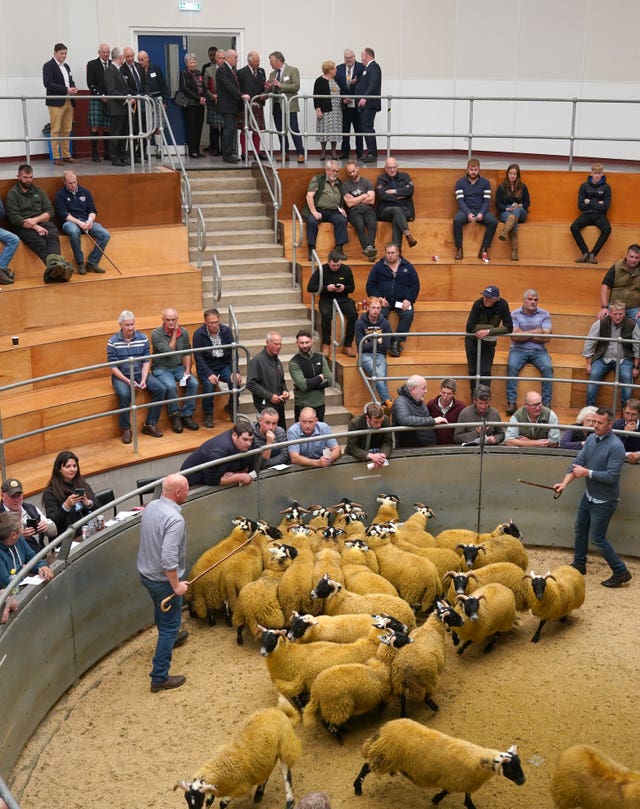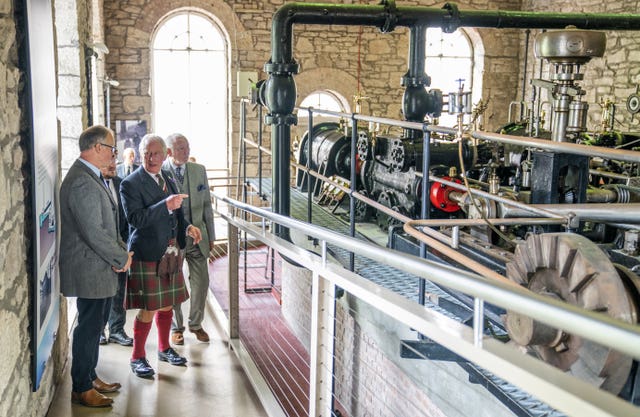The Prince of Wales stroked some Clydesdale horses and rode in a carriage as he helped commemorate the breed’s recent tricentenary.
Lanark Community Development Trust had hoped to install a sculpture honouring Clydesdale horses in time for the 300th anniversary of the breed in 2020, but the project was delayed by the pandemic.
On Wednesday, Charles, wearing a kilt in Hunting Rothesay tartan, visited the site outside Lanark Auction Market where the sculpture was finally unveiled this summer.
He was greeted by Lady Susan Haughey, Lord Lieutenant of Lanarkshire, and Sylvia Russell, chairwoman of Lanark Community Development Trust, and met sculptor Dan Adams, who told him how he had created the artwork.
A number of Clydesdale horses, including two police horses, were in the field beside the sculpture and the prince stroked some of them as he chatted to the people looking after them.
Charles, who is known as the Duke of Rothesay in Scotland, then climbed into a horse-drawn carriage along with Millar Stoddart, Deputy Lord Lieutenant of Lanarkshire, and they were driven to the door of the auction market.

Mrs Russell said the trust was “delighted” that the prince, who has been patron of The Clydesdale Horse Society since 2007, had paid them a visit.
She said: “It was wonderful to meet the prince. We were thrilled he decided to come and visit. He was very interested in everything.
“It is just over 300 years since the first Clydesdale horse was bred. We had hoped to have the statue up for the anniversary in 2020 but it was delayed by the pandemic.
“The breed is very, very local to the area and we just wanted to commemorate the heritage of our area.
“We want people to be aware of the heritage of the town and breed and decided to erect a statue.”

Sculptor Mr Adams, from the Cod Steaks model-making company in Bristol, said he enjoyed meeting Charles.
“It was an honour,” he said. “He is a lovely chap.
“He was asking how the sculpture was put together and how long it took to make and if I enjoyed it.
“It took about two weeks to design and two months to build, and it was a very nice piece to work on.”

Inside the auction market, the prince viewed an exhibition of Clydesdale memorabilia and met Clydesdale Horse Society volunteers, officials and donors as well as Lanark Auction Market staff and young farmers.
He also viewed a Blackface ewe sheep sale, which was in progress.
Earlier in the day, Charles visited New Lanark, a purpose-built mill village created by David Dale and Robert Owen in the 18th century. It became a model for industrial communities that was to spread across the world in the 19th and 20th centuries.
Charles viewed a display of industrial artefacts and was also expected to see giant steam engines and the huge main textile room where the preserved looms are still in operation, producing textiles for commercial use.

Later on Wednesday, the prince was due to meet the parents of a teenager who died from an allergic reaction to a Pret a Manger baguette.
Scientists from around the world have travelled to Dumfries House in Ayrshire for a two-day global symposium on allergies, organised by the Natasha Allergy Research Foundation and hosted by Charles.
The foundation was set up by Tanya and Nadim Ednan-Laperouse, whose 15-year-old daughter, Natasha, died in 2016 following a severe allergic reaction to sesame in a sandwich.
Charles has said he was “moved beyond words” by her death and the way her parents have “selflessly dedicated themselves to preventing other families suffering in the same way”.

The prince will take part in a roundtable discussion with scientists and Mr and Mrs Ednan-Laperouse.
Seventeen world-leading allergy experts from the UK, US, Finland, Germany, Hong Kong and Denmark are attending the event.
Natasha died on July 17 2016 after eating a Pret artichoke, olive and tapenade baguette before boarding a flight from Heathrow to France with her father and best friend.
A coroner concluded that she would not have eaten the baguette if the sesame seeds – to which she was severely allergic – had been mentioned on the label.




Comments: Our rules
We want our comments to be a lively and valuable part of our community - a place where readers can debate and engage with the most important local issues. The ability to comment on our stories is a privilege, not a right, however, and that privilege may be withdrawn if it is abused or misused.
Please report any comments that break our rules.
Read the rules hereLast Updated:
Report this comment Cancel